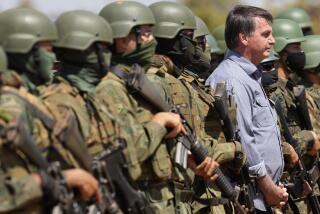Hope for Nigeria in Ex-Dictator
- Share via
Olusegun Obasanjo once ruled Nigeria as a military dictator. But now, freely elected as president last weekend, he offers the best hope that democracy will finally take root after 15 years of brutal and ineffective military rule. The new president will have to make hard economic choices to rejuvenate the West African country. If he cannot gain the trust of all factions, this round of civilian rule will go the way of the other interludes between dictatorships.
Because of the corruption and abuse of power by a series of military leaders, trust does not come easy in Nigeria. Political unity is further discouraged by ethnic and regional loyalties and a growing class divide in the nation, Africa’s most populous.
Obasanjo is suspect because he is a retired general, and some opponents see him as a pawn of the army. His supporters counter that 20 years ago when he was president he turned over power to civilian rule. That round of democracy didn’t last long and the generals returned. Obasanjo himself criticized military rule and ended up a political prisoner of Gen. Sani Abacha before the military strongman died unexpectedly last June.
The new president is a Christian from the southwest and a member of the Yoruba ethnic group. Yet, other Yoruba question his allegiance and fear that he has sold out to the more powerful north, which is dominated by Muslims. His most bitter detractors criticize his 1979 law that gave all oil rights to the government. That law denied oil profits to people who live on or near the oil fields, while shameless military leaders and their friends fattened their bank accounts.
Hunger and poverty are rampant in Nigeria. The economy is in tatters and the infrastructure has been badly damaged by the politics of neglect. These are the challenges Obasanjo must conquer if Nigeria is to make a permanent break from military rule.
More to Read
Sign up for Essential California
The most important California stories and recommendations in your inbox every morning.
You may occasionally receive promotional content from the Los Angeles Times.













